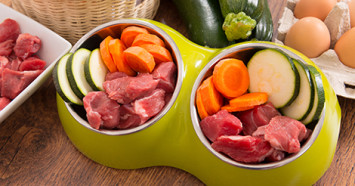
The raw diet debate has been going on for decades, and it’s just as controversial now as ever. Sometimes known as the BARF diet (bones and raw foods diet) the idea of serving raw meat, bones, and organs to your dog seems logical, but it definitely has some drawbacks over kibble or canned foods. Always talk to your vet first about the healthiest feeding plan for your dog. Here is what you should consider when looking into the raw debate.
Raw Diet Ingredients
Organ and muscle meat
Ground or whole bones
Raw eggs
Dog safe fruits, vegetables, and dairy (apples, broccoli, yogurt, carrots, etc.)
The Pros of the Raw Diet for Dogs
Supporters of the raw diet believe that it increases the quality and quantity of a dog’s life while promoting healthier teeth, coat, and digestive process. Some believe that feeding a more primitive diet offers a healthier approach.
Trends in human nutrition lean toward eating less processed foods, and the same makes sense for your dog. But few among us eat perfectly clean diets without the assistance of any processed or pre-made foods. Attempting to provide your dog with a balanced, safe, and healthy diet can be a real challenge, and impractical for many budgets and lifestyles.
The Cons of the Raw Diet for Dogs
The biggest source of debate about the raw diet is safety, even the American Veterinary Medical Association (AVMA) has concerns. They stated, “The AVMA discourages the feeding to cats and dogs of any animal-source protein that has not first been subjected to a process to eliminate pathogens because of the risk of illness to cats and dogs as well as humans.” One thing is certain: keeping raw foods around small children or immunocompromised individuals is risky due to the increased risk of salmonella, E-coli, campylobacter, and listeria. In a perfect world, raw might be the right choice, but in reality, it’s a very difficult and possibly unsafe option.
Many vets often find raw diets to be inconsistent and inadequate for a balanced diet. Dietary insufficiencies are common in raw-fed dogs, which can lead to organ failure and serious orthopedic problems. Very few vets feed raw diets themselves, opting to do extra research and pick a quality commercial food.
Finally, modern dogs have evolved to need a much different diet than their wolf-like ancestors, so many argue that a raw diet is unnecessary.
Can Dogs Eat a Raw Diet?
Yes. But a great deal of research and prep work is needed to meet a dog’s nutritional and health needs. A long history of breeding has resulted in the domesticated dog becoming an entirely different species from his wolf cousins. Many dogs can tolerate raw foods without problems, but as a whole, dog’s bodies have adapted to drawing the nutrients they need from cooked food. Further, dogs are omnivores, meaning they need specific amounts of plants/fruits/veggies/roughage as well as meat to thrive. One scientific veterinary study determined that almost 70% of homemade raw diets did not have the proper nutrients the dog needed. Furthermore, as with the AVMA’s concern of transmitting salmonella, E. coli, campylobacter, and listeria to humans (i.e. both from making the meal and from coming into contact with the dog’s saliva, face, and feces), these diseases can also make some dogs ill. As can chomping down on poorly-prepared bones, which may not pass through the intestines.
Raw Diet Meal Prep
You can certainly prepare raw meals yourself – and many raw-feeding pet parents do. However, in recent years, pet food manufacturers are increasingly providing raw foods, even in local grocery stores. It’s likely cheaper and more customizable to provide your dog with meat directly from a butcher, farm, or other food source than buying ready-made raw meat meals. Either way you shake it, the raw diet is likely to be more expensive than even a high quality kibble diet.
If you’re thinking about the raw diet for your dog, or variations of home prepared meals, you might have asked if dogs can eat mashed potatoes? But remember, that in exploring raw diets, it is important to understand which vegetables and roots are safe fo them. For more detailed insights, check out what Dr. Patty Khuly has to say about the pros and cons of home cooking for dogs.